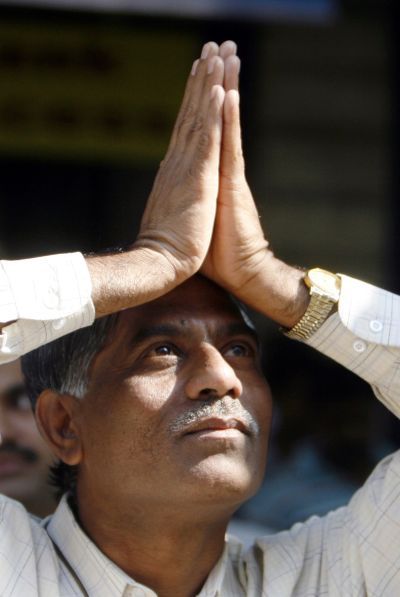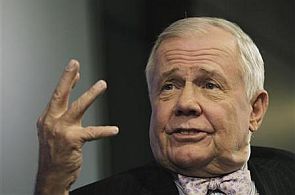 'The government doesn’t seem to do what’s necessary to make India the economic power it has been many a time in the past.'
'The government doesn’t seem to do what’s necessary to make India the economic power it has been many a time in the past.'
'It is very difficult for foreigners to buy and sell stocks in India.'
'Your central banker is less bad than most (central bankers across the globe).'
Equity markets regained some of the lost ground in March.
Jim Rogers, bottom, left, chairman of Rogers Holdings and author of Street Smarts: Adventures on the Road and in the Markets, tells Puneet Wadhwa he expects problems in global financial markets in the next few years.
“The Indian government doesn’t understand economics and should leave the economy and markets alone,” he says.
Excerpts:
Global markets have seen a good run over the past few weeks. Is this sustainable?
No, I don’t think so. Central banks have again loosened their purses and put in more money.
All that money has come into the markets and that’s all there is to this rally.
I am not optimistic about the global economy for the next couple of years.
Japan is already in recession and some parts of Europe are suffering. All this will get worse, as there is nothing to make the world get better.
What about India?
India is not different from the rest of the world. Your central banker is less bad than most (central bankers across the globe).
However, the Indian government doesn’t seem to understand economics and they don’t seem to do what’s necessary to make India the economic power it has been many a time in the past.
What, in your opinion, should the government do -- in terms of policy action to bring back investors, including you, to its shores?
Well, nothing -- just leave the markets and the economy alone.
It is very difficult to invest in India, especially for foreigners.
It is very difficult for foreigners to buy and sell stocks in India.
Likewise for currencies, bonds and commodities.
That apart, it is very difficult for anyone to buy and sell anything related to agriculture in India, as there are massive regulations/restraints/controls. Most of these make things worse for India.
The government needs to get out of the way.
There are plenty of smart Indians in the country but the government thinks they’re smarter than everybody.
They even think they are smarter than the markets but they’re not.
How are you evaluating the emerging markets as an investment destination?
I am not buying emerging markets. I am still on a wait–and–watch mode as regards EMs.
You expect more downside for EMs from here on?
I expect a downside just about everywhere.
I like agriculture as an asset class and believe it is a good time to short global markets.
There will be problems worldwide in financial markets in the next few years.
 Which economies or geographies are still investment-worthy?
Which economies or geographies are still investment-worthy?
I think the world’s financial markets will have serious problems in the next couple of years and EMs will not be able to resist this. I did buy some Russian government bonds for the short term recently.
I am looking at Kazakhstan, Nigeria and Iran -- but I haven’t done anything anywhere else.
What are some of those problems?
I expect wild stock market swings, interest rate increases, currency swings and bankruptcies to impact world economies over the next couple of years.
Your views on economic and policy-related developments in China.
Chinese companies that trade with the outside world will suffer as the world does, especially those which have built up debt. Others such as those cleaning up pollution will be fine.
Is the worst over for the Chinese stock market?
I don’t think so because the serious financial problems in the world will affect everyone.
Are you long or short on China?
I am still long.
Do you think the euro zone or the European Union can disintegrate?
The problems relating to ‘Brexit’ are concentrated in the EU. I don’t think the British will move out.
In case they do, it will cause more turmoil in the UK and the rest of the world as well. As it is, I foresee a lot of market turmoil over the next few of years.
The US Federal Reserve has cut its forecast of interest rate hikes to two in 2016, from the earlier four.
How do you interpret this?
Well, the US central bank has said they will not raise interest rates more this year -- not more than once or twice. I think they have panicked, like before.
When things looked a little troublesome, they panicked and didn’t know what they’re doing.
They want to again flood the world with money.
As a result, the markets have gone up.
Eventually, market sentiment is going to overpower them, as the markets will not be able to take in more money.
The markets, I believe, have more money than the central banks.
Is the US economy headed into recession over the next few years?
Yes, certainly, in the next year or two.
Is the worst over for crude oil prices? What is the road ahead? How about gold?
I think investors will get a chance to buy gold lower in the next couple of years. I don’t know if it will be the case in the next 12 months or not.
Crude oil prices, on the other hand, are in the process of making a complicated bottom.
There could be developments across the globe that could see oil prices spike down but after that, I do see oil recovering.
Image: An investor gestures with folded hands towards the Bombay Stock Exchange building while watching a large screen displaying India's benchmark share index in Mumbai. Photograph: Arko Datta/Reuters













 © 2025
© 2025